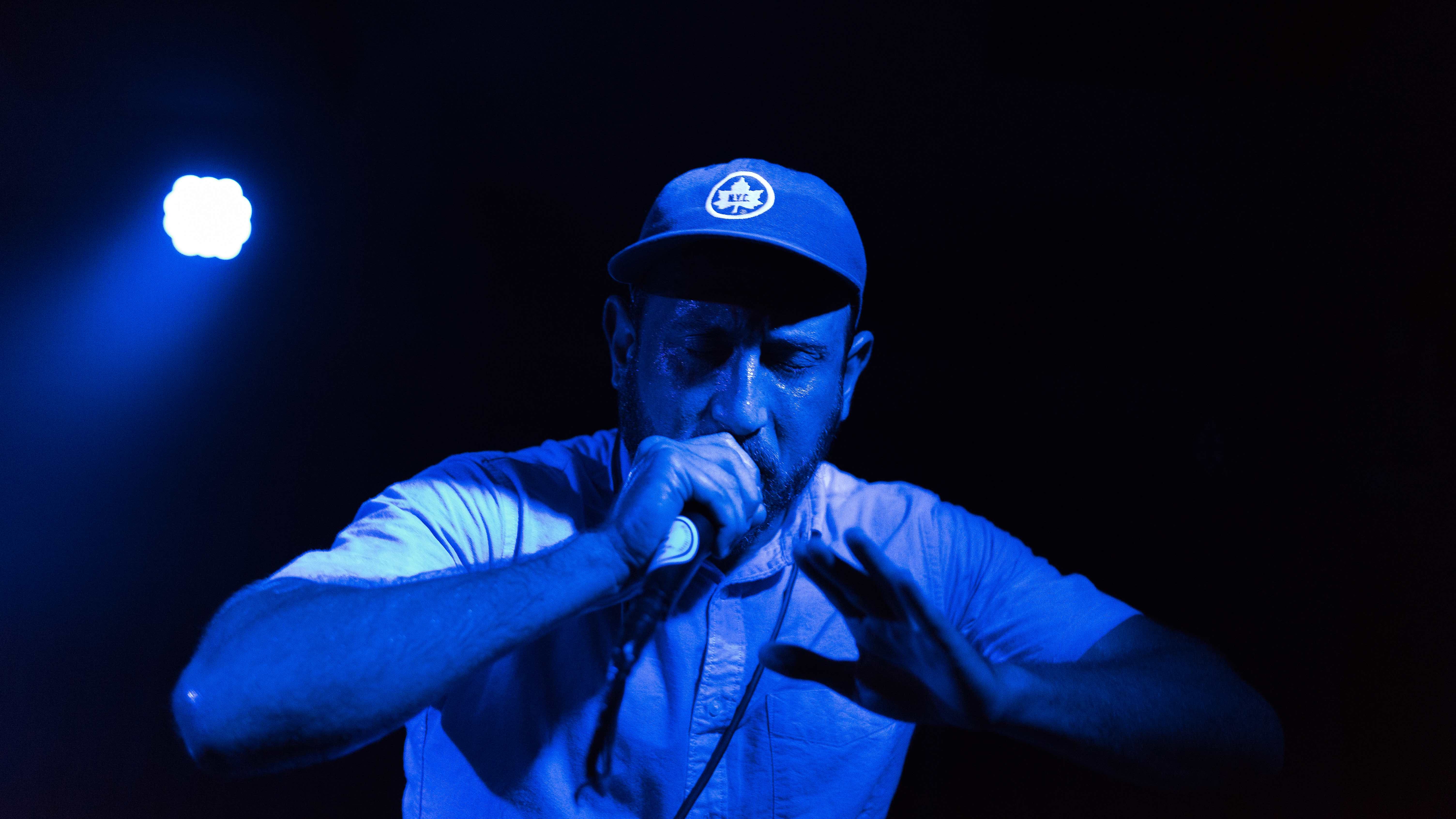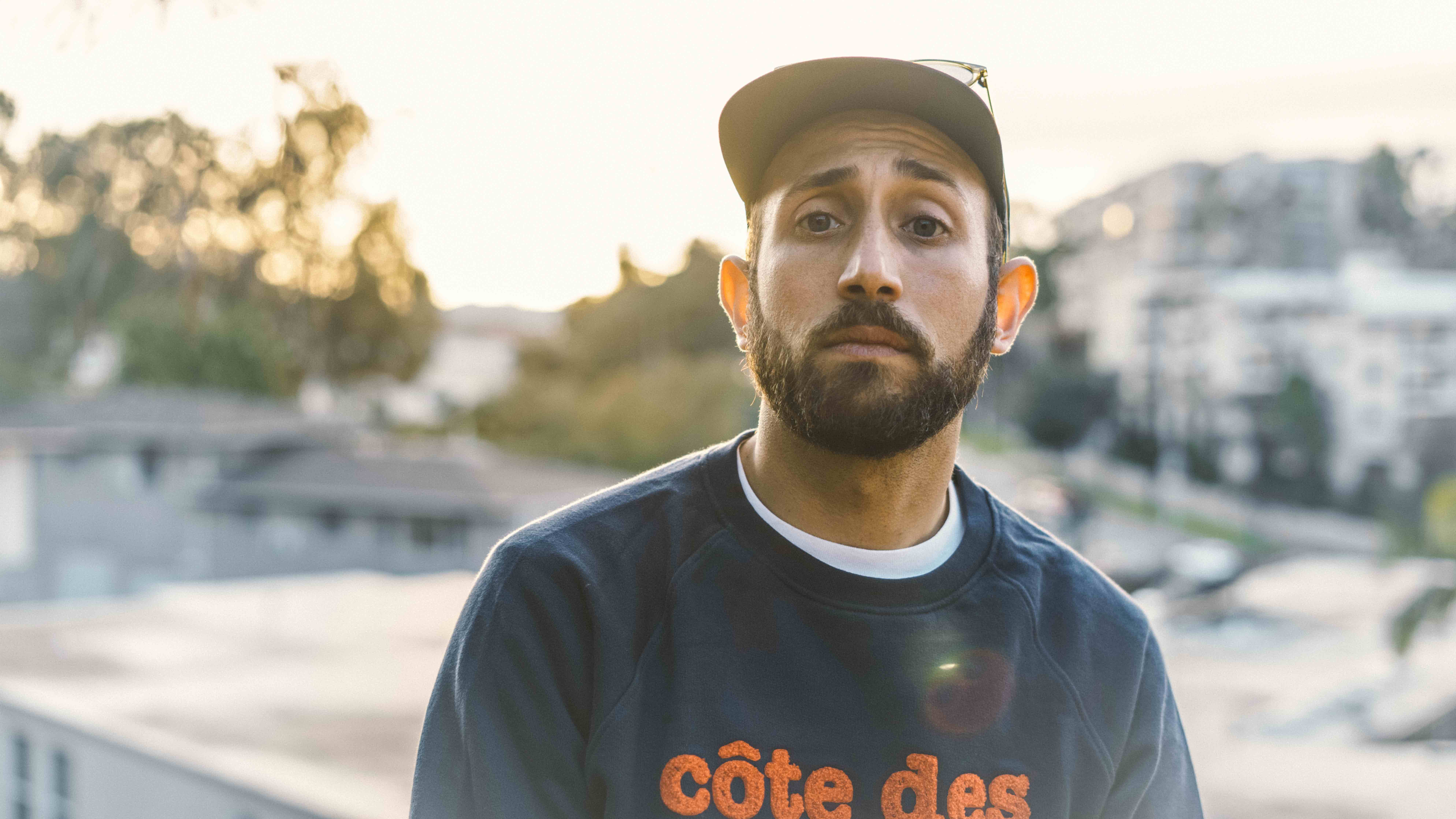If rapper Henry Canyons’ oeuvre suggests a long-winded, globetrotting search, it’s because his very existence speaks to the power of art as compass. A native of Cobble Hill, Brooklyn who now calls Los Angeles home, his family’s landfall in the States was the completion of a journey spanning twentieth-century art worlds.
The son of a Brooklynite father and Parisian mother, Canyons traces his creative pedigree back to the Second World War. “My grandfather was French-Jewish and escaped Paris during the war,” Canyons recounts via phone from LA. “He made it to Brazil and left behind a career in medicine, randomly finding the art world as a dealer and curator. He started in Brazil and then came back to France in the ’50s. In the ’60s he was one of the guys really focused on European contemporary art and spreading that overseas.”
Whether it’s his proclivity for recording vocals over muted jazz horns or full-on rapping in French, the continental influence is never beyond arm’s reach in Canyons’ music. His latest full-length Cool Side of the Pillow, released in April by the avant garde label Backwoodz Studioz, is a meticulously composed meditation on seeking comfort from persistent stresses. Yet even if Cool Side’s emotional static seems pushed to the peripheral in favor of a more calibrated smoothness, it marks an arrival point in the wider pilgrimage of Canyons’ catalog.
In the fall of 2016, Canyons decamped to the South of France for a two-month artist’s residency in Biarritz. While the small seaside city’s environs offered a reprieve from his California day-to-day, it wasn’t a complete culture shock; his mother and grandmother, who live full-time in France, were nearby. Still, the product of that residency, a six-track EP titled La Côte West, is the diary of a stranger in a strange land, a man stuck between two worlds with knowledge that his hard-won escape from the pressures of young adulthood is only temporary. It’s a breakup record, but the relationship itself is opaque and often secondary—the record is, effectively, a deep retreat into Canyons’ own head.
Once the residency was over, Canyons hung on in France with hopes of circulating a collection of songs he’d previously recorded in LA with childhood friend Matt “Bones” Bowen—an EP which would ultimately become Cool Side of the Pillow. “I was showing the project to a few people and I realized, EPs are hard, dude,” he recalls. “They’re hard to market, hard to get out, and if you’re gonna do vinyl, EPs don’t really make sense. That kind of opened my eyes, so I proposed the idea of a full-length to Bones.” Revisiting a batch of unused beats the duo had collaborated on, Canyons got back to writing. “I stayed in France for another three months, just at my mom and my grandma’s house working.”
“I would never say that I love LA, but I really like living here. I’m very proud of the things I’ve built, my friends who have become family. It took time to get there, but now I feel like I know what I’m doing.”
Canyons seems much at ease on Cool Side, a soothing masterpiece (though not necessarily by all of the standards usually ascribed to rap albums). Lyrical hip hop is rarely deployed as mood music, because a sixteen-bar verse, with its density of syllables and attitude, is too broad a palate for a monochrome ambience. And while Canyons’ raps are intensely wordy, they aren’t conversational or narrative so much as declamatory, exploring sentiments rather than events. Where there’s movement—and there’s tons of it, a robust, kinetic energy—it contributes to an overall serenity. In this sense, Canyons’ verses resemble paintings, precise in their nuance and detail but furnishing their own consistent, self-contained logic. Canyons’ brushstrokes can seem jagged up close, but a few steps’ distance lends them an impressionistic glow.
The rappers most frequently recognized as great and transcendent—the Chuck Ds, Scarfaces, and Gurus of the world—are ceremonial rather than impressionistic, so reliable in their narration and certain in both their delivery and observation that even their vulnerabilities are bulletproof. The content of Canyons’ words is never this self-assured, but his voice and immaculate breath control are instruments such that his delivery is, even at its most eccentric. Cool Side’s “Easy Come, Easy Go” employs a heretofore unseen triplet flow over a standard 4:4 time signature.
In the way a beautifully translated text captures the exactness of words eroded from spoken vernacular, Canyons’ discursive rhyme patterns leverage rich language to express familiar feelings, as on Cool Side’s title track, its balanced placidity offsetting undertones of menace. His accounts maintain a high-art atemporality due to the modulated abstraction of his references and reliance on few, if any, pop culture touchstones. A verse on the shimmering “Goodnight Moon” opens: “As I sit under the sky, I wonder why / Sipping on my cup of joe, eating humble pie / Your testament’s a sentiment, why would I wanna lie? / You nullify what I want to underline.” His truisms (“I sweat through beats, achieve true peace / Only get one life, just signed a new lease”) never devolve into empty platitudes.
Canyons had to travel no further than the house next door to find his Cool Side creative partner. “I’ve known Bones since he was six years old,” he says. “He’s my little brother’s best friend, basically my surrogate little brother. Our backyards were connected, so we’ve basically grown up together. I always leaned on him for mixes, and then he started showing me some of the beats he was working on and it just clicked.”
Cool Side’s heady musical aesthetic is largely sample-based, its source material culled through old-fashioned crate-digging. “I listen to a lot of jazz, man,” Canyons says. “I got a shit-ton of vinyl from a friend who was moving, although a number of the songs are digital rips. I send my bookmarks to Bones, and a lot of the time I really don’t know what I’m gonna get in return. But we’re really good at communicating—he knows me so well that he’s able to cut up the samples and ideas I give him in a way that works for me.”
Bones and Canyons operate within a range of moderate tempos and lively basslines, but instrumental surprises abound: “Quiet Tongues” is founded on a smoky harmonica sample, whereas the hi-hat on “Not Today” infuses the song with a jittery anxiety. While their music embodies an ambition comparable to that of Canyons’ celebrated Backwoodz labelmates, it’s more approachable than the dystopian hellscapes of billy woods and Elucid. Where the duo’s Armand Hammer project proclaim the apocalypse, Canyons’ wariness and uncertainty manifest in sincerity.
“I’ve been a fan of Backwoodz for a long time,” Canyons says, looking back on his undergraduate days at Lewis & Clark College in Portland. “When I was a freshman in college, one of my hippie homies showed me billy woods’s Camouflage, his first solo record from ’03. This was ’05—I was like, “Holy shit.” Then another one of my homies was randomly recording with Phantom Power, Backwoodz’ engineer-slash-co-owner at the time. I went over to the studio on a break, met him, and asked if I could get woods to come to my school.” After raising money through a student activities board, he flew woods’ group Super Chron Flight Brothers to campus for a show and they struck up a friendship. “I’ve always looked up to woods—he’s a huge mentor of mine,” Canyons says. “One day he was like, ‘Dude, how would you feel about putting something out on Backwoodz?’ I was like, ‘Dude. That would be amazing.’”
Canyons’ first LP with Backwoodz, 2015’s Canyonland, was rife with misgivings about life in general and his new home in Los Angeles specifically. “I was definitely super ambivalent writing that record,” he says. “It took me two years to get to know the city and decide whether or not I liked it. I didn’t realize how much I was writing about LA until I looked at the tracklist and was like, “Shit, I’m talking about the city a lot.” But I couldn’t help it—it was still fresh, I was finding my voice and where I fit artistically and personally.

photo by M.W. Singer
“Now I’m more comfortable,” he continues. “I would never say that I love LA, but I really like living here. I’m very proud of the things I’ve built, my friends who have become family. It took time to get there, but now I feel like I know what I’m doing.”
If Canyonland and La Côte West evince wandering displacement, Cool Side of the Pillow illustrates healthy coping. As ever, Canyons scours the past—both his own and his family’s—for keys to the present. His grandparents are omnipresent supporting characters; “I’m On It” opens: “Okay, come take a walk with me / Keep your chin up, there’ll be a lot to see / Some words of wisdom my grandpa imparted me / Mantras and mottos are my lock and key.” (True to form, billy woods’ show-stopping guest verse on “It Don’t Mean a Thing” supplies the album’s only conflicted take on filial succession: “I’m older than my father when he had me / Not sure if that means I’m doing well, or more badly.”)
On the last night of summer, the weather starting to turn, I caught a live Canyons set in Brooklyn unveiling the Cool Side of the Pillow tracks. For Canyons, the homecoming show capped a summer highlighted by a European tour run with indie rap mainstays PremRock and Fresh Kils (“Literally the time of my life,” Canyons says) and a residency at A Simple Bar in the Hollywood Hills. That night, his mentor billy woods made a surprise performance, and lifelong friend Bones joined onstage for a finale. The next morning it was back to LA, home enough for now, an artist’s residence to the extent that art finds its place. FL







